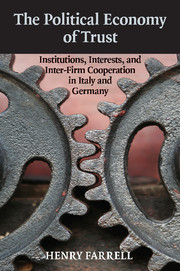Crossref Citations
This Book has been
cited by the following publications. This list is generated based on data provided by Crossref.
Egan, Michelle
2010.
Research Agendas in EU Studies.
p.
216.
Levi, Margaret
2010.
Beyond the Tragedy of the Commons: A Discussion of Governing the Commons: The Evolution of Institutions for Collective Action.
Perspectives on Politics,
Vol. 8,
Issue. 2,
p.
573.
Elsner, Wolfram
and
Heinrich, Torsten
2011.
Sectors Matter!.
p.
115.
Dobrokhotov, R.
2011.
Trust as Viewed by Economists and Psychologists <i>(On the Book by A. V. Belyanin and V. P. Zinchenko "Trust in Economy and Social Life")</i>.
Voprosy Ekonomiki,
p.
136.
Lewis, Orion A.
and
Steinmo, Sven
2012.
How Institutions Evolve: Evolutionary Theory and Institutional Change.
Polity,
Vol. 44,
Issue. 3,
p.
314.
2012.
Martin Luther King Jr. and the Morality of Legal Practice.
p.
81.
Herreros, Francisco
2012.
The state counts: State efficacy and the development of trust.
Rationality and Society,
Vol. 24,
Issue. 4,
p.
483.
Evans, Ana Maria
2013.
Building institutional capacity: from pervasive individualism to sustained coordination in small firm sectors.
Business and Politics,
Vol. 15,
Issue. 2,
p.
163.
Murdie, Amanda
2014.
Scrambling for contact: The determinants of inter-NGO cooperation in non-Western countries.
The Review of International Organizations,
Vol. 9,
Issue. 3,
p.
309.
ELSNER, WOLFRAM
and
SCHWARDT, HENNING
2014.
Trust and arena size: expectations, institutions, and general trust, and critical population and group sizes.
Journal of Institutional Economics,
Vol. 10,
Issue. 1,
p.
107.
Locke, Richard M.
2014.
The Politics of Representation in the Global Age.
p.
200.
Vigoda-Gadot, Eran
and
Mizrahi, Shlomo
2014.
Managing Democracies in Turbulent Times.
p.
1.
O’Mahoney, Joseph
2014.
Rule tensions and the dynamics of institutional change: From ‘to the victor go the spoils’ to the Stimson Doctrine.
European Journal of International Relations,
Vol. 20,
Issue. 3,
p.
834.
Elsner, Wolfram
and
Schwardt, Henning
2015.
From Emergent Cooperation to Contextual Trust, and to General Trust: Overlapping Meso-Sized Interaction Arenas and Cooperation Platforms as a Foundation of Pro-Social Behavior.
Forum for Social Economics,
Vol. 44,
Issue. 1,
p.
69.
Abdelal, Rawi
2015.
The multinational firm and geopolitics: Europe, Russian energy, and power.
Business and Politics,
Vol. 17,
Issue. 3,
p.
553.
Gallo, Zelia A
2015.
Punishment, authority and political economy: Italian challenges to western punitiveness.
Punishment & Society,
Vol. 17,
Issue. 5,
p.
598.
Robbins, Blaine G.
2016.
When Social Constraints Increase Trust.
Socius: Sociological Research for a Dynamic World,
Vol. 2,
Issue. ,
Robbins, Blaine G.
2016.
Probing the Links Between Trustworthiness, Trust, and Emotion.
Social Psychology Quarterly,
Vol. 79,
Issue. 3,
p.
284.
Robbins, Blaine G.
2016.
What Is Trust? A Multidisciplinary Review, Critique, and Synthesis.
SSRN Electronic Journal,
Robbins, Blaine G.
2016.
What is Trust? A Multidisciplinary Review, Critique, and Synthesis.
Sociology Compass,
Vol. 10,
Issue. 10,
p.
972.



